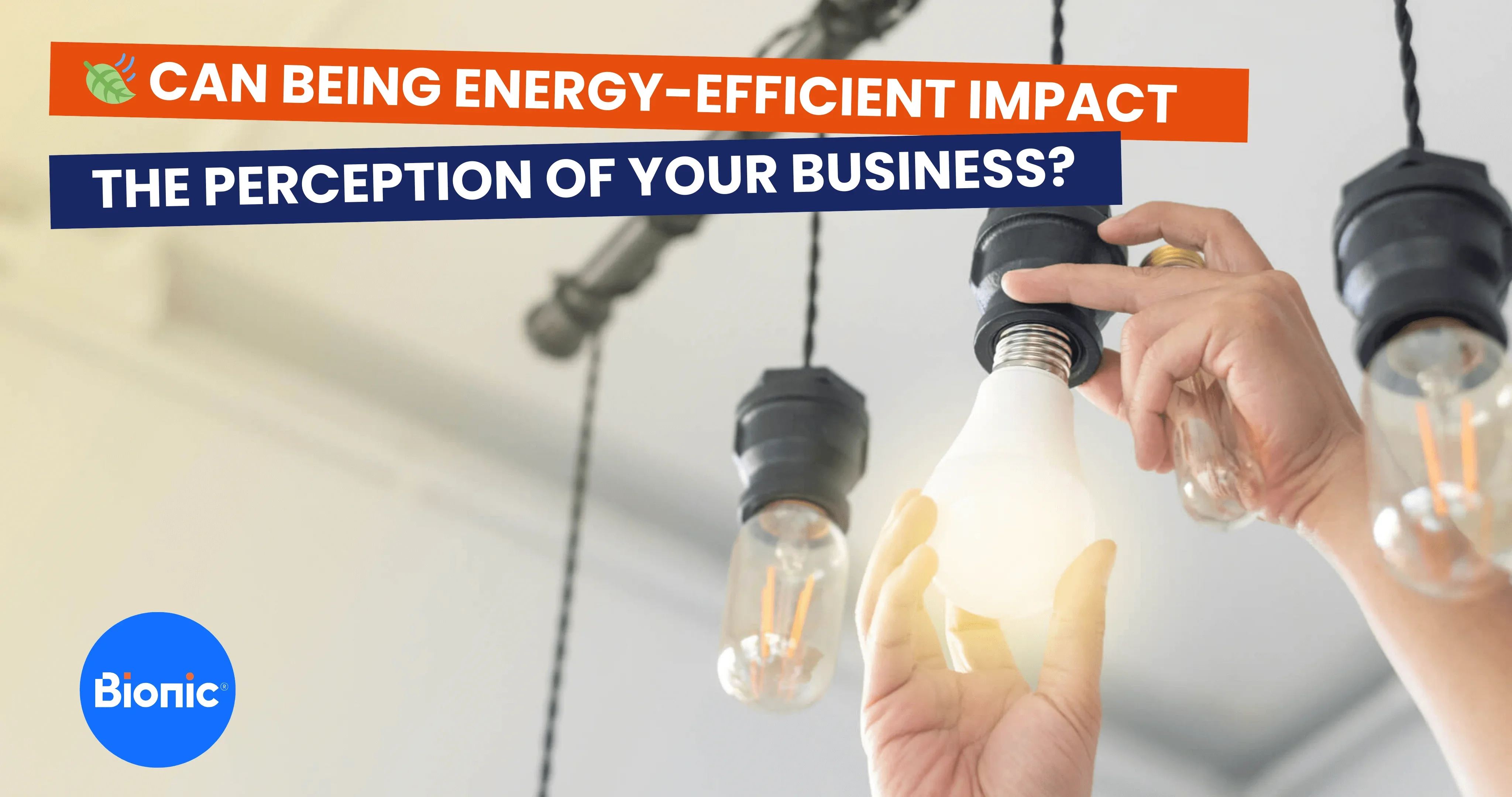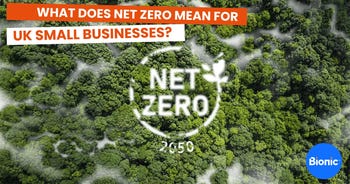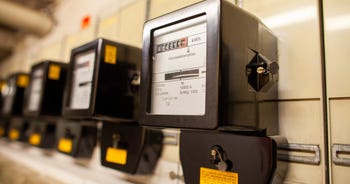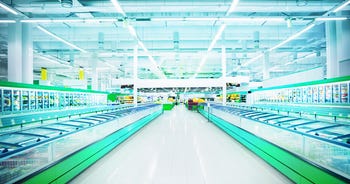Energy-efficiency importance: Can being energy efficient impact the perception of businesses?
The way you present your business to the public is crucial, whether you're trying to get things off the ground or looking to retain your customer base. As people become more eco-conscious, this can be especially true when it comes to sustainability.
A study by Smartest Energy shows that 4 out of 5 people describe themselves as likely to choose a brand with a positive approach to environmental sustainability. But, the same study revealed that 45% of consumers are unaware of the practices brands have adopted to encourage environmental sustainability.
Customer perception of a brand clearly affects their chances of making a purchase.
Are you an energy-efficient business? If so, are you making it clear to your customers?
And, as energy costs remain a key concern for UK SMEs, it could be argued that how you manage and communicate your energy efficiency practices has never been more important. Especially as new reporting requirements come into force, like Market-Wide Half-Hourly Settlement (MHHS).

In this Bionic guide, we’ll explore the importance of energy efficiency practices and the impact this can have on the perception of your business.
We'll also cover the latest regulatory requirements, practical energy audit approaches, and how UK businesses are building credibility through measurable sustainability action.
Five-point summary of our guide to energy efficiency and the perception it can have on your business
- Customers are more likely to choose a brand that shows real commitment to sustainability. But if you’re not shouting about your energy-efficient practices, people won’t know. Clear, visible action helps build trust and attract environmentally conscious customers.
- Simple switches—like LED lighting or turning off unused tech—can cut your energy bills and free up cash for other parts of your business. Being green isn’t just good for the planet, but it’s also good for your profit margins.
- Businesses that show they’re energy-conscious stand out. Whether you’re applying for grants, attracting investors, or winning customers, energy efficiency can be part of what makes your brand different (and more appealing).
- Energy regulations are tightening. From EPC ratings to net-zero goals, staying efficient means staying ahead of legal requirements. It also shows your business is proactive and responsible—something that matters to customers and stakeholders.
- From Sainsbury’s reintroducing Fairtrade to brands like Troubadour and First Milk earning B Corp status, businesses that embrace sustainability see reputational wins. Going green isn’t a nice-to-have—it’s a proven way to build loyalty and grow.
What is energy efficiency, and why should it matter to my business?
Energy efficiency, while often seen as a technical term, is essentially about making wise and thoughtful choices when it comes to how your business uses energy.
Basically, wherever possible, your business should use energy efficiency measures like installing LED light bulbs and turning off monitors when not in use to help your business save money and reduce your carbon footprint.
Business energy audits - assessments of your gas and electricity consumption against business needs - can help identify waste and create actionable savings plans across lighting, heating, equipment, and employee habits.
But why does all this matter to small businesses? Well, using more energy-efficient measures can do wonders for your brand, but can also offer the following benefits:
Help your business save money
What if you could cut down on your monthly energy bills? Energy efficiency allows you to do just that. By using energy more wisely, you can significantly reduce your operational costs, freeing up resources for other critical aspects of your business.
Research shows UK businesses can reduce energy bills by up to 25% through efficiency improvements. Data from 6,000 smart meters has revealed that almost half (46%) of all business electricity consumption happens outside normal 8 am to 6 pm working hours. Switching appliances off if you don't operate outside of these hours, or switching to a time-of-use tariff if you do, offer significant savings opportunities.
Reduce impact on the environment
Energy efficiency is a way to demonstrate your commitment to reducing your carbon footprint. Consuming less energy shows your business contributes to a healthier planet and aligns with global sustainability goals, whether that’s upgrading to newer, more efficient equipment or appliances or educating your employees about sustainable working habits.
Keep in line with regulatory compliance
Governments and regulatory bodies are placing greater weight on energy efficiency. There are often rules and standards in place that businesses must follow, like getting an EPC certificate.
Under SECR (Streamlined Energy and Carbon Reporting), approximately 11,900 large UK companies must now disclose annual energy use, carbon emissions, and energy efficiency measures. This applies to quoted companies and large unquoted companies or LLPs meeting two of three criteria: more than 250 employees, turnover above £36 million, or balance sheet total above £18 million.
Ensuring compliance not only avoids legal issues but also shows your business is taking steps to be environmentally responsible.
Give your business a competitive edge
Being energy-efficient can set your business apart from the competition. Customers and investors are more likely to support environmentally conscious companies. Energy efficiency can be a part of your brand identity and attract those who appreciate your commitment to sustainability.
What is brand perception?
Brand perception refers to how consumers and the general public perceive and interpret a brand. Essentially, it’s all of the thoughts, feelings, opinions and associations people have with a company, which can be influenced by a wide range of factors, including marketing efforts, product quality and customer experience. Every brand wants their perception to be positive - here are the key things to consider about yours:
- Brand image — This is the mental picture that people have of a brand. It includes visual elements like logos and packaging, as well as more abstract concepts like the brand's personality and values.
- Brand reputation — A brand's reputation is built over time and is based on its actions, products, and interactions with customers. A positive reputation can enhance brand perception, while a negative one can damage it.
- Brand awareness — This refers to how well people recognise and recall a brand. High brand awareness means that the brand is top of mind when consumers think about a particular product or category of products.
- Brand associations — These are the aspects or characteristics that people associate with a brand. For example, a brand might be associated with qualities like reliability, innovation, or cheap pricing. Some brands may collaborate with a celebrity or influencer to piggyback off their reputation. But this doesn’t always leave a brand in a positive light, so pick your collaborators wisely!
How do energy efficiency and brand perception work together?
When a brand emphasises and practices energy efficiency, it can positively impact how consumers perceive the brand.
Energy efficiency showcases a business's environmental responsibility, appealing to consumers who prefer eco-friendly choices. This often leads to cost savings and, consumers may associate a brand with being more financially responsible.
Also, energy-efficient brands are seen as more innovative and forward-thinking, meaning they can gain a more competitive edge in the market where sustainability actually matters.
By engaging in energy efficiency, a brand can demonstrate corporate social responsibility, enhance its long-term vision, and even boost employee happiness. Overall, energy efficiency can help create a brand image that reflects the responsibility, innovation, and sustainability a company demonstrates, which can attract environmentally-conscious consumers and enhance long-term brand loyalty.
Modern consumers increasingly expect businesses to back up environmental claims with evidence. Regulators are now treating misleading environmental statements - known as "greenwashing" - with the same seriousness as false financial ones, making it essential that every "green" claim is supported by measurable data and transparent reporting.
How does energy efficiency impact a business's environmental footprint?
Energy efficiency can make a real impact on a business's carbon footprint, especially if a business uses self-generated electricity. This is because it directly reduces the business's energy consumption, meaning less demand for fossil fuels and other resources, like wind and solar power, required for energy generation. This means, there are fewer greenhouse gas emissions and less air pollution, leading to environmental sustainability.
Energy efficiency also ensures that energy resources are utilised more effectively, reducing wastage. Some companies even use energy management software to help them do this, by identifying inefficiencies in business operations so improvements can be made. This means fewer resources are used and there is less of a strain on the environment.
Energy efficiency often leads to a reduced reliance on finite and non-renewable energy sources and instead leads to companies adopting cleaner and more sustainable energy alternatives, like geothermal or biomass. This shift away from limited resources lessens the environmental impact, including habitat destruction, which is often associated with extracting these energy resources.
Collectively, SMEs account for around half of UK business greenhouse gas emissions, so every business, no matter how small, has a big part to play. The UK government's 2026 industrial strategy aims to cut power costs for energy-intensive firms by approximately a quarter through changes to green levies and infrastructure funding, making energy efficiency investments more financially viable.
How can energy efficiency help build a brand's image?
Building your brand image is one of the most important things you can do. Get it wrong, and it could be detrimental to the development and future of your business.
But being energy-efficient can help contribute to your image in several important ways:
Transparency
Demonstrating a commitment to energy efficiency showcases transparency in your business operations. When consumers see your brand actively working to reduce its energy consumption, they perceive honesty and integrity in your practices.
Transparency builds trust, which is a cornerstone of a positive brand image. With mandatory assurance for sustainability data anticipated from 2026, ESG reporting will need to meet the same level of scrutiny as financial reporting, requiring reliable systems, controls and audit trails to provide evidence for every claim.
Sustainability
Energy efficiency is a key component of sustainability. When your brand is associated with sustainable practices, it communicates that you are taking responsible steps to minimise your environmental impact.
Sustainability is a value that resonates with many consumers, and it can enhance your brand's image as one that cares about the planet and future generations.
Although not relevant to many (if any) small businesses, it's worth noting that sustainable land use practices, including reforestation, afforestation, and responsible agriculture, are increasingly being incorporated into corporate strategies alongside energy efficiency measures.
Compliance and regulations
Complying with energy efficiency regulations and standards showcases that your brand operates within the bounds of the law.
It communicates a sense of responsibility and adherence to ethical business practices — which some businesses don’t follow.
This adherence to regulations can enhance your brand's image as a law-abiding and trustworthy entity, giving you more credibility among consumers. From 2026, the UK will progress the Sustainability Disclosure Requirements framework, which will consolidate existing corporate reporting regulations and introduce mandatory Sustainability Reporting Standards (SRS) overseen by the Financial Conduct Authority.
Customer loyalty
Energy-efficient practices often result in cost savings, which can be passed on to customers in the form of lower prices or improved products and services.
When customers see that your brand is not only environmentally responsible but also considerate of their wallets, it can foster immense loyalty. Loyal customers are more likely to stick with your brand and recommend it to others, enhancing your brand's image through word-of-mouth.
Discover more about brand loyalty and the ways it can benefit your business.
Long-term viability
Embracing energy efficiency is a sign of long-term thinking and strategic planning. It communicates that your brand is focused on sustainability and long-term viability rather than short-term gains. This perception can attract investors who are interested in businesses with a strong and enduring future, further enhancing your brand's image in the eyes of stakeholders.
Banks and investors increasingly prefer businesses with clear sustainability plans, which can lower borrowing costs and improve access to capital.
Learn more about finding the right investor for your business with our guide.
Are there any examples of businesses boosting their reputation by going green?
To give you an idea of how going green could help boost the reputation of your business, here are some recent examples of how UK businesses have done just that.
Sainsbury’s brings back Fairtrade tea
Sainsbury’s has brought back the Fairtrade label to its classic tea range. It’s a big win for farmers and for the brand. Sales of Fairtrade tea shot up by 50% after the switch.
That’s expected to raise almost £1 million in premiums to support farmers facing the challenges of climate change. This step reinforced Sainsbury’s position as an ethical leader in UK retail and demonstrated how sustainable choices can positively impact both communities and brand reputation.
First Milk leads with regenerative farming
Dairy co-operative First Milk is putting sustainability at the heart of everything it does. It’s now the UK’s largest regenerative farming programme in dairy—and it’s just getting started.
The business has already sequestered over 100,000 tonnes of carbon and is on track to hit net zero by 2040.
First Milk is also a certified B Corp and a winner of the King’s Award for Sustainable Development. That’s helped it build trust and stand out in a competitive sector.
Troubadour Goods turns bags into a circular story
London brand Troubadour Goods is showing how fashion can be both stylish and sustainable. Its Orbis Circular Collection uses 100% recycled materials—and looks great doing it.
The brand is a certified B Corp and has been praised by Marie Claire and ISPO for leading the way in circular design. By combining quality with a strong green message, Troubadour is winning over eco-conscious customers.
Community Clothing champions UK-made fashion
Community Clothing is proving that slow fashion and UK manufacturing can still thrive. It works with more than 30 mills and factories around the country, using up leftover fabrics to cut waste.
The clothes are simple, durable, and designed to last—no fast fashion here. This ethical approach helped them land a major partnership with Team England for the 2022 Commonwealth Games. It’s a brand with a mission, and people are taking notice.
What are B-Corp businesses?
B Corp-certified companies are those verified by B Lab to meet high standards of social and environmental performance, transparency, and accountability.
B Corp-certified businesses aren’t just ticking boxes—they’re growing faster too.
In 2023–24, UK B Corps saw average revenue growth of 23%. That’s well ahead of their non-certified competitors. Customers trust the badge. Investors like the focus on responsibility. For many businesses, going green isn’t just good ethics, it’s a smart strategy.
What are some energy-efficient products businesses can put in place?
There are some simple and easy switches or adjustments you can make to your business to reduce energy consumption and enhance sustainability.
LED lighting
LED (Light Emitting Diode) lighting is an energy-efficient alternative to traditional incandescent and fluorescent lighting. LED bulbs use significantly less electricity, have a longer lifespan, and emit less heat, making them an excellent choice for illuminating office spaces, warehouses, and retail environments. Upgrading to LED lighting can result in substantial energy savings.
Studies show LED bulbs use up to 90% less energy than traditional incandescent bulbs and last up to 25 times longer, making them one of the quickest wins for business energy efficiency.
Find out more about the ways your business can save money with proper lighting with our guide.
Solar panels
Solar panels are a renewable energy solution that allows businesses to generate their electricity from sunlight. By installing solar panels on rooftops or open areas, businesses can reduce their reliance on grid electricity and lower energy costs over the long term.
Solar power can be especially beneficial for companies with high energy demands or those looking to demonstrate a commitment to clean energy.
A study from Centrica, parent company of British Gas, has found that almost two-thirds of UK businesses intend to increase onsite generation capabilities over the next two years, with solar power being one of the most accessible ways to do this. Capital grants can cover up to 45% of project costs, with funding ranging from £10,000 to £100,000 in some regions, and potential payback periods as short as three years.
Windows and insulation
Improving building insulation and upgrading windows to more energy-efficient models can have a significant impact on heating and cooling costs. Proper insulation and energy-efficient windows help maintain indoor temperatures, reducing the need for excessive heating or air conditioning.
This is particularly important for businesses with large commercial spaces or those that operate out of a warehouse. High-quality insulation work, including mineral wool insulation and sealing air leaks, can significantly reduce heat loss and lower carbon dioxide emissions.
Occupancy sensors
Occupancy sensors are motion-activated devices that control lighting and HVAC systems based on occupancy levels in a room or area. They automatically turn off lights and adjust temperature settings when no one is present, preventing unnecessary energy consumption.
These sensors are ideal for spaces like conference rooms, bathrooms, and office spaces. Motion sensor lighting in intermittently used areas like hallways and meeting rooms can cut lighting costs dramatically.
Energy management systems
Energy management systems (EMS) are comprehensive solutions that enable businesses to monitor, control, and optimise their energy usage. They often include software, hardware, and sensors that provide real-time data on energy consumption and enable businesses to implement energy-saving strategies. EMS can help identify energy waste, schedule equipment usage efficiently, and manage energy-intensive processes.
Smart meters allow businesses to track energy usage patterns in real-time. This can help identify peak consumption times to see if you should shift usage to cheaper off-peak periods via a time-of-use tariff. This is critical when nearly half of all business electricity use happens outside normal working hours.
Battery storage systems
On-site battery storage systems work alongside solar panels or other renewable energy sources to store excess energy for use during peak demand periods. This reduces reliance on grid electricity during expensive peak hours and provides backup power resilience.
Electric vehicle charging infrastructure
Installing EV charging points demonstrates environmental commitment and prepares businesses for the transition to electric fleets. With government incentives available and the phasing out of petrol and diesel vehicles, EV infrastructure is becoming essential for forward-thinking businesses. Learn more in our guide to electric vehicles for small businesses.
Heat pumps and modern heating systems
Upgrading from outdated boilers to energy-efficient heat pumps or modern heating systems can dramatically reduce energy consumption. Government funding supports heat pump installation as part of the UK's net-zero strategy, with significant long-term savings on heating bills.
Get your business set with Bionic
Becoming an energy-efficient business can seem like a daunting task, but like anything, it starts with taking some small steps that could pay off in the long run.
If you need more help understanding how business energy works, get in touch today with the Bionic team. We’re also on hand to help with your business energy needs, including business electricity and business gas. Or do you want to read up on business energy yourself? Head over to our energy guides section to see content from our energy experts.
FAQs on the importance of energy efficiency for your business
Here’s an at-a-glance guide to some of the most frequently asked questions about energy-efficiency and the perception of your business:
How does energy efficiency affect customer perception of UK businesses?
Energy efficiency positively impacts customer perception by demonstrating environmental responsibility, transparency, and innovation, with 80% of UK consumers more likely to choose sustainable brands.
What are the energy reporting requirements for UK businesses in 2026?
UK businesses meeting SECR criteria (250+ employees, £36m+ turnover, or £18m+ balance sheet) must disclose annual energy use, carbon emissions, and efficiency measures, with new Sustainability Reporting Standards coming into force.
How much can UK businesses save through energy efficiency improvements?
UK businesses can reduce energy costs by up to 25% through efficiency measures like LED lighting, smart meters, and heating optimisation, with quick payback periods on most investments.
What is a business energy audit, and why is it important?
A business energy audit systematically assesses energy consumption across lighting, heating, equipment, and building infrastructure to identify waste and create actionable savings plans worth potentially millions annually.
What is B Corp certification, and how does it relate to energy efficiency?
B Corp certification verifies businesses meet high environmental and social performance standards, with UK B Corps achieving 23% average revenue growth in 2023-24, demonstrating that sustainability drives business success.
What government grants are available for business energy efficiency in the UK?
UK businesses can access capital grants covering up to 45% of renewable energy project costs (£10,000-£100,000 range), plus funding for heat pumps, solar panels, and battery storage systems.
How do smart meters help UK businesses improve energy efficiency?
Smart meters provide real-time energy usage data, helping businesses identify peak consumption patterns, shift usage to cheaper off-peak periods, and reduce waste from the 50% of electricity used outside working hours.
What are the benefits of solar panels for UK businesses in 2026?
Solar panels reduce grid reliance, lower long-term energy costs with 3-year payback periods, qualify for government grants, and demonstrate sustainability commitment that enhances brand reputation and customer trust.








